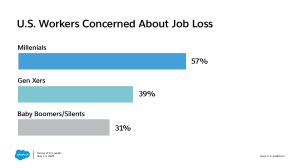Click here to explore data across demographics and geographies.
Over the past two months, our kitchens, living rooms, and basements have become offices, Zoom meetings have replaced face-to-face encounters, and weekly unemployment numbers have set record after record. To say that the nature of work has changed would be an understatement, and the implications will last long after this crisis.
A Salesforce survey of 3,542 members of the general population — 2,204 of whom are employed on a part- or full-time basis — across six major countries provides detail on how the crisis is impacting workers of different backgrounds, and hints at what employers can do to build resilience.
Here are some key findings from our sample of the U.S. workforce:
Younger workers fear job loss
Forty percent of the U.S. workforce is extremely or quite concerned about the security of their jobs. 47% go as far to say that they’re worried about losing their current positions. While this concern is relatively stable across income brackets, generational divides are apparent. 57% of millennials in the U.S. are worried about losing their jobs, versus just 31% of baby boomers.

Low income workers seek more resilient options
Although the majority of the U.S. workforce (53%) believes they could easily find a new position in their current role or industry, were they to be laid off, just 47% of low income workers believe their skills are in high demand (compared to 75% of high-income workers). Women in the U.S. also feel relatively vulnerable, with 55% believing employers would seek out their skills, compared to 66% of men.
Workers in certain industries feel relatively confident in their future prospects, while others seek greener pastures. At the high end, 61% of U.S. workers in the financial services sector believe they could easily find a similar position if needed, while 46% of government workers say the same. 52% of workers in the hard hit U.S. travel and hospitality sector say they want to work in a different industry. Interestingly, nonprofit workers are the least likely to believe their skills are in demand by employers, but also the least likely to seek work in a different industry.

Remote work could be the new normal
Regardless of whether or not they want a new job, workers are spending far less time commuting. 62% of the U.S. workforce is currently working remotely, four-fifths (80%) of whom started doing so since the onset of the COVID-19 pandemic.
Remote work is most prevalent in the financial services sector, 88% of whose U.S. workers are working from home, compared to a low of 48% of U.S. healthcare workers (perhaps due to the large contingent of nurses, doctors, and support staff) and 52% of U.S. retail workers.
63% of those working from home in the U.S. claim to be as productive now as they were prior to the pandemic, and 63% say they are closer to families as a result of dropping their commute. This forced experiment in remote work has prompted 67% of remote workers in the U.S. to become interested in making such arrangements permanent, with big implications for employers.

Employees seek trust, communication, and flexibility
Practical worker resources are top-of-mind for business decision-makers these days, and for good reason. Case in point: Just 39% of U.S. remote workers rate the software and applications provided by their employers as excellent, and 38% say the same for the hardware provided.
More than anything, however, remote workers seek trust and communication from their employers. 56% of U.S. remote employees say demonstrated trust in employees is very important.

In addition to the employee experience and future of work, Salesforce Research surveyed the general population on how the COVID-19 pandemic is impacting their behaviors as consumers and expectations of companies. To explore more findings from the study, visit our interactive Tableau Public dashboard.
Remote and in-office productivity are on par, but with a low baseline
Just 34% of U.S. remote workers consider reduced workloads as very important during the COVID-19 pandemic — a lower figure than any other employer action that calls into question any assumptions of laziness in remote workers. In fact, a mere 17% of U.S. remote workers say they are less productive than they were in the office. However, only 42% rate their current productivity as excellent, calling into question the status quo regardless of setting.
Methodology
Salesforce conducted a double-blind survey of adults, a subset of which consisted of full- and part-time employees, in the United States, United Kingdom, France, Germany, Brazil, and Australia. Data was collected between May 1 and May 2, 2020 and yielded 3,542 responses. Data is weighted to accurately represent the general population.















